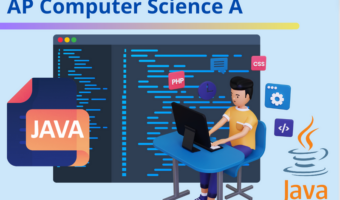AP Computer Science A: Course and Exam Overview
About This Course
Course Description: The AP Computer Science A course is designed to introduce students to the fundamental concepts of programming and computer science. This course emphasizes object-oriented programming, problem-solving, and algorithm development, providing a solid foundation in Java programming. Students will learn to design, write, and test code while gaining an understanding of the ethical and social implications of computing.
Encouraging Students and Parents to Participate
- Real-World Applications: Highlight how the skills learned in this course are directly applicable to real-world scenarios. Students will gain practical programming experience that can be used in college and future careers.
- College Credit: Explain that successful completion of the AP Computer Science A exam can earn students college credit, giving them a head start in their higher education journey.
- Comprehensive Support: At Brilliant Academe, we provide expert mentors, hands-on projects, and continuous support to ensure students are fully prepared for the AP exam.
- Career Opportunities: Emphasize the growing demand for computer science professionals and how this course is a stepping stone toward lucrative and fulfilling careers in technology.
- Parental Involvement: Encourage parents to get involved by attending informational sessions, monitoring progress, and motivating their children to pursue excellence in this course.
Frequently Asked Questions (FAQ) for AP Computer Science A
1. What is AP Computer Science A?
- AP Computer Science A is an advanced placement course designed to introduce students to the fundamentals of computer science with a focus on object-oriented programming in Java. The course emphasizes problem-solving, algorithm development, and the practical application of programming concepts.
2. Do I need prior programming experience to take this course?
- Prior programming experience is not required. The course starts with basic concepts and builds up, making it accessible to beginners.
3. What programming language will I learn in this course?
- The course focuses on Java, a widely-used, object-oriented programming language.
4. What topics are covered in the AP Computer Science A syllabus?
- The syllabus includes topics like Primitive Types, Using Objects, Boolean Expressions and if Statements, Iteration, Writing Classes, Arrays, ArrayLists, 2D Arrays, Inheritance, and Recursion.
5. How is the AP Computer Science A exam structured?
- The exam consists of two sections: multiple-choice questions and free-response questions, where students write code to solve specific problems.
Learning Objectives
Quizzes: You'll participate in quizzes that assess your understanding of programming concepts, syntax, problem-solving skills, and algorithm development.
Coding Assignments: You’ll plan and write code for a variety of tasks, developing your ability to create efficient and effective solutions using Java.
Discussions/Presentations: Speaking and collaboration are vital in computer science. You’ll engage in both class-wide and small group discussions, sharing your thought processes and presenting your coding projects.
Projects: You’ll have the opportunity to explore your own ideas, apply your coding skills creatively, and collaborate with peers. You’ll demonstrate your understanding through various projects using industry-standard tools and technologies.
Curriculum
Unit 1: Primitive Types (2.5–5%)
Description: Learn the basics of Java programming, including data types (int, double, boolean, etc.), variable declarations, and simple operations. Understanding primitive types is essential for building more complex programs.
Unit 2: Using Objects (5–7.5%)
Description: Discover how to create and use objects in Java. This includes understanding constructors, methods, and the interaction between objects. Mastery of this topic enables you to design more modular and reusable code.
Unit 3: Boolean Expressions and if Statements (15–17.5%)
Delve into logical thinking with boolean expressions, and control the flow of your program using if, else-if, and else statements. These concepts are foundational for decision-making in your programs.
Unit 4: Iteration (17.5–22.5%)
Description: Explore loops (for, while, do-while) to repeat tasks efficiently. Iteration is key to processing data, automating repetitive tasks, and solving complex problems in a manageable way.
Unit 5: Writing Classes (5–7.5%)
Learn how to design and implement your own classes. This includes defining attributes and methods, encapsulation, and creating objects. Writing classes is crucial for building object-oriented applications.
Unit 6: Arrays (10–15%)
Study arrays, a fundamental data structure that stores collections of items. Learn how to declare, initialize, and manipulate arrays to manage and process data efficiently.
Unit 7: ArrayList (2.5–7.5%)
Understand the ArrayList class, a dynamic array structure that allows for flexible storage and manipulation of data. This topic covers adding, removing, and accessing elements, as well as understanding the advantages of using ArrayLists over arrays.
Unit 8: 2D Arrays (7.5–10%)
Explore 2D arrays, which are used to represent data in a grid-like structure. Learn how to declare, initialize, and traverse 2D arrays, and apply these concepts to solve more complex problems, such as in games and simulations.
Unit 9: Inheritance (5–10%)
Grasp the concept of inheritance, which allows you to create new classes based on existing ones. This unit covers superclasses, subclasses, overriding methods, and the use of polymorphism to create flexible and reusable code.
Unit 10: Recursion (5–7.5%)
Delve into recursion, a powerful technique where a method calls itself to solve a problem. Learn to identify when recursion is appropriate and how to implement recursive algorithms for problems like searching, sorting, and more.




